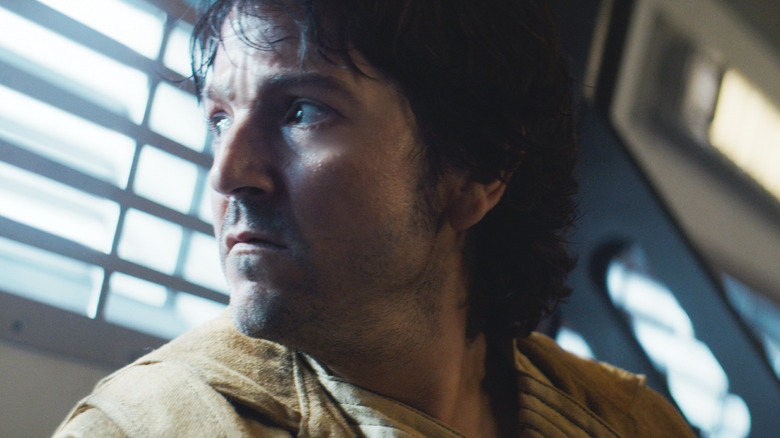How Andor Episode 8 Draws More Parallels To Real World Conflicts And Controversies
This post contains spoilers for episode 8 of "Andor."
The heist on Aldhani is having ripple effects on "Andor," and even the wealthiest individuals in the "Star Wars" universe are starting to take notice. After last week's episode ended with Cassian Andor (Diego Luna) being sentenced to six years in prison for little more than looking over his shoulder, the show's eighth episode, "Narkina 5," follows the Rebel-in-the-making as he's taken to one of several Imperial facilities on the titular world. Elsewhere, Mon Mothma (Genevieve O'Reilly) once again finds herself stuck having to mingle with the other members of high society on Coruscant, which leads to a rather interesting conversation that rings all too familiar.
We've written before about how "Andor" wears its politics on its sleeve more than the other live-action "Star Wars" series, in ways that feel all-too-real for anyone who's been tuning in since, well, September 11, 2001 (if not earlier). That trend continues with "Narkina 5," where the topic of Emperor Palpatine and his newly-enacted P.O.R.D. (Public Order Resentencing Directive) comes up. But as troubling as Mon's rich friends find their leader's extreme actions to be, they're not about to stick their necks out too far by doing more than voicing the mildest of concern.
P.O.R.D., a piece of legislation passed in response to what the Empire declared a "terrorist attack" on Aldhani, bears more than a fleeting resemblance to the Patriot Act, itself designed to allow for increased surveillance and the doling out of harsher punishments by the U.S. government in the name of maintaining security post-9/11. Of course, authorities using any and all excuses to tighten their grip on the general population is nothing new, and the Patriot Act is far from the only real-world example of this that "Narkina 5" brings to mind.
'I'm fearing your definition of wrong'
Anyone who's ever been part of a conversation about a certain former President of the United States will probably bristle at the way Mon's guests talk about Palpatine's latest fascist actions. Sure, they agree he's "frustrating" and "too easily provoked," but they also appreciate that he "says what he means." And much like anyone who's dared to object to this type of infuriating respectability politics and middle-of-the-road defenses when applied to said ex-POTUS, those in her orbit mostly ignore Mon when she challenges them to make their meaning clearer by asking, "What does he mean? What is public order?"
Carrying on, one of Mon's guests reasons, "If you're doing nothing wrong, what is there to fear?" It's an argument that has come up time and time again in defense of the Patriot Act, but it's also one people have brought in relation to more recent issues in the wake of the Black Lives Matter protests and the increased calls to "defund the police." Of course, it's also a reductive defense that ignores other factors, like systematic prejudice and the measures that are already in place to protect those authority figures who abuse their special powers. "I'm fearing your definition of wrong," Mon replies.
Indeed, we've already seen how someone like Cassian could be sentenced to an excessive prison sentence (that's putting it in the mildest of terms) for doing quite literally nothing wrong, and it's safe to assume he's far from the first person to suffer such an unjust fate at the hands of Palpatine and his Empire. Nor, for that matter, will he be the last, now that the Imperials are clamping down harder than ever on working-class civilians in the "Star Wars" universe.
The prison industrial complex
Besides taking a look at how the upper class on Coruscant justifies sitting idly by and doing nothing to stop the Empire as it seizes greater control of the universe, "Narkina 5" is the first episode of "Andor" to take us inside one of the Imperials' prisons. The facility where Cassian winds up is truly despicable, forcing prisoners to perform strenuous manual labor for 12-hour shifts as part of stations that compete to outperform one another (with the "loser" being painfully electrocuted as punishment). It's a dystopian nightmare, but one would expect nothing else from Palpatine's regime.
Anyone who isn't part of high society or fails to deliver the results the Empire wants suffers under their watch, as has come up before in /Film's "Andor" recaps. That goes double for those caught up in the "Star Wars" universe's prison-industrial complex, which allows the Imperials to force prisoners to build weapons, machinery, and other supplies at no extra cost beyond the minimum it takes to keep them fed and healthy enough to keep working. Once again, it's impossible not to think of related issues in the real world, in this case the push for prison reform in the U.S. Is our way of doing things really so far removed from that of the Empire?
It's a distressing thought, but "Narkina 5" is probably the bleakest episode of "Andor" so far, and one that very much benefits from its political commentary being written by Beau Willimon (the scribe behind "The Ides of March" and creator of the U.S. "House of Cards"). Then again, by this point in the series' run, it ought to be crystal-clear: If escapism is what you're after, this isn't the "Star Wars" show you're looking for.
New episodes of "Andor" premiere Wednesdays on Disney+.


